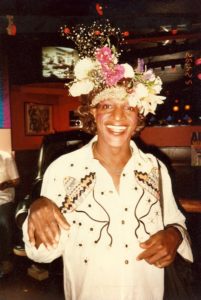 It would not be LGBT+ History Month if we did not pay recognition to one of the most important individuals ever in the crusade to equality. For centuries, LGBT+ people have been victims of abuse and persecution from society despite the ongoing efforts of many to change this. With that in mind, today is Marsha P. Johnson’s day to shine!
It would not be LGBT+ History Month if we did not pay recognition to one of the most important individuals ever in the crusade to equality. For centuries, LGBT+ people have been victims of abuse and persecution from society despite the ongoing efforts of many to change this. With that in mind, today is Marsha P. Johnson’s day to shine!
Marsha was born in 1945 in New Jersey, U.S. as Malcolm Michaels Jr. (MMJ) and grew up in a devoutly religious home. As MMJ grew older, they were subjected to harassment and abuse in the community and remained private with their sexuality.
At the age of 17, MMJ moved to New York City and her life changed for the better by making friends within the LGBT+ community and coming out as a proud gay man. It was here that MMJ would adopt the name Marsha P. Johnson as a drag persona but would later adopt Marsha as part of their identity.
Marsha made many friends within the city and would perform in drag across many bars. They would actively be involved with numerous grassroot activists and campaign for better treatment of gay men. It wasn’t long before Marsha’s name was known by thousands and the work that they were doing.
Marsha would struggle for many years in New York city. Homeless and working as a sex worker, this took a major toll on their health. Marsha found themselves under constant threat and abuse from police and public simply for being gay and dressing how they chose to.
One fateful day, June 28th 1969, following excessive police violence toward Marsha and their community at the Stonewall Inn in Greenwich Village, New York, they and many others decided enough was enough and things had to change, and thus the Stonewall uprising began.
In the early hours of that morning Marsha, one of the key leaders, Sylvia Rivera, Stormé DeLarverie and hundreds of others, including Bob Dylan, took to the streets to fight back against the brutality and assault that the community had been receiving. Bricks were thrown, garbage cans were set ablaze and street fixtures were torn from the ground and used as weapons by and against the police. The message was clear: we’re here, we’re queer, get used to it.
The riots continued for days by numerous activist groups in various ways and places across the city. It was a sign that the LGBT+ community were no longer taking abuse and the world had to accept them as human beings. Stonewall had not only sparked a revolution but it gave the most marginalised people the power and bravery to create a better life for themselves and others.
Marsha P. Johnson died in 1992 under what is believed to be suspicious circumstances. In spite of their death, the lasting legacy and efforts of Stonewall continue to this day. Marsha’s bravery and persistence for a better world continues to this day and their memory lives on through the work of many in an effort for global LGBT+ equality.

Google Doodle celebrating Marsha P. Johnson
You can find out more about the life and efforts of Marsha P. Johnson and those involved with Stonewall by searching online but here are a few key points to get you started:
- The Death and Life of Marsha P. Johnson, a documentary film was released on Netflix in 2017.
- History provide a full timeline of events for the Stonewall uprising.
- Visit the website of The Stonewall Inn and read more about their story and legacy.
- Help raise awareness and money for the Marsh P. Johnson Institute, a charity for the protection and defence of black transgendered people. If you wish to support a UK based charity then there is always the Black Trans Alliance and the Black Trans Foundation.
Respond
